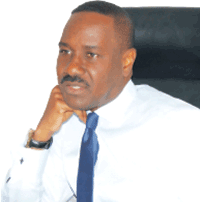• Continued from last edition.
Tensions between the north and the south continue to dictate Nigeria’s political environment.
To at least install some balance, parties from north and south agreed to rotate the presidency. Meaning that a president from the southern region should always follow a president from the northern region and vice versa.
Each president can stay on for (no more than) two terms.
This informal arrangement did ease tensions somewhat, but at the same time reduced the accountability of Nigeria’s leaders.
Put differently, by allowing the arrangement to stand, it becomes less likely that voters will hold their leaders accountable for past mistakes. Instead, leaders are chosen on the basis of their ethnicity and the practice of favouritism is widespread.
Reasons why we are where we are
Nigerians do not agree on anything – everyone is pursuing personal interest to the detriment of national interest. Greed and corruption are rampant.
Corruption does not take place only in government. At religious organisations, private offices, schools, even our homes, corrupt practices are endemic.
Everyone is struggling to grab his share of the so-called ‘national cake’. Political appointments have become an opportunity to ‘eat and settle’ the boys and families and communities of such appointees.
The ‘carnival’ that takes place at the State House during the swearing-in of new ministers is a pointer to this.
Another reason for our deplorable state is the issue of bad leadership and the lopsided structure of the nation.
“When we hear a house has fallen, do we ask if the ceiling fell with it?” – Chinua Achebe.
Notable novelist Chinua Achebe’s tongue-in-cheek is a take on how everything rises and falls on leadership.
But it also begs the question whether a ‘House of Nigeria’ ever existed; if yes, what kind of ‘house’ was it?
Renowned constitutional lawyer, Professor Ben Nwabueze in a widely published article, ‘A New Nigeria of our Dream’, says “the Constitution is defective and unfit for the no less unacceptable reason that the federal system which it establishes for the government of the state, while generally accepted as best suited to the circumstances and needs of the country, is too lop-sided and unbalanced by over-concentrating too much power and financial resources at the centre at the expense and to the detriment of the states which comprise the ethnic nationalities; it thereby fails to establish and maintain a proper balance between the needs and demands of building a nation and the preservation of diversity in a multi-ethnic, multi-religious and multi- cultural country.”
Wole Soyinka’s submission spells out the crux of the trouble with the Nigerian edifice: “Centralisation, in short, has been the bane of the nation – on any level you choose – and nothing will answer the necessity of a harmonious relationship and development of its parts other than a severe curtailment of the control of the Centre over the functioning of its parts … any re-designing of the nation’s internal portrait must depend absolutely on strategies that emanate from the people themselves.”
We have had poor, uneducated, uniformed, visionless, uncommitted leadership by largely selfish and ignorant people who lack proper training and character.
Apart from our covetous, barren and unproductive leadership, another issue is our equally greedy, impoverished and apathetic following.
During fuel subsidy crisis in January 2012, you could hear a lot of people saying “thank God, I didn’t bother to come out and vote.”
That kind of sentiment must change. You must be ready to get involved at whatever level, starting with yourself and your immediate environment and community.
What are our common goals?
Fuel subsidy crisis has shown that it is time for us all as Nigerians to stand up and agree on the basic tenets of our nation.
Some of those basic things we must all agree on as a nation and pursue vigorously include:
1. There must be an end to corruption and suppression by an elite ruling class.
2. There must be provision of suitable infrastructure and basic needs for the ordinary Nigerian.
3. There must be equal opportunity and a level playing field for all, irrespective of origin, class, religion, ethnicity or political affiliation.
We all must call a referendum to agree on these things and whichever government cannot deliver must stand down.
Every Nigerian must sign to this charter and agree to look for leaders who by history, proven track record and antecedent can deliver.
We will no longer put in power people who have not clearly proven themselves in leadership either in public or private.













